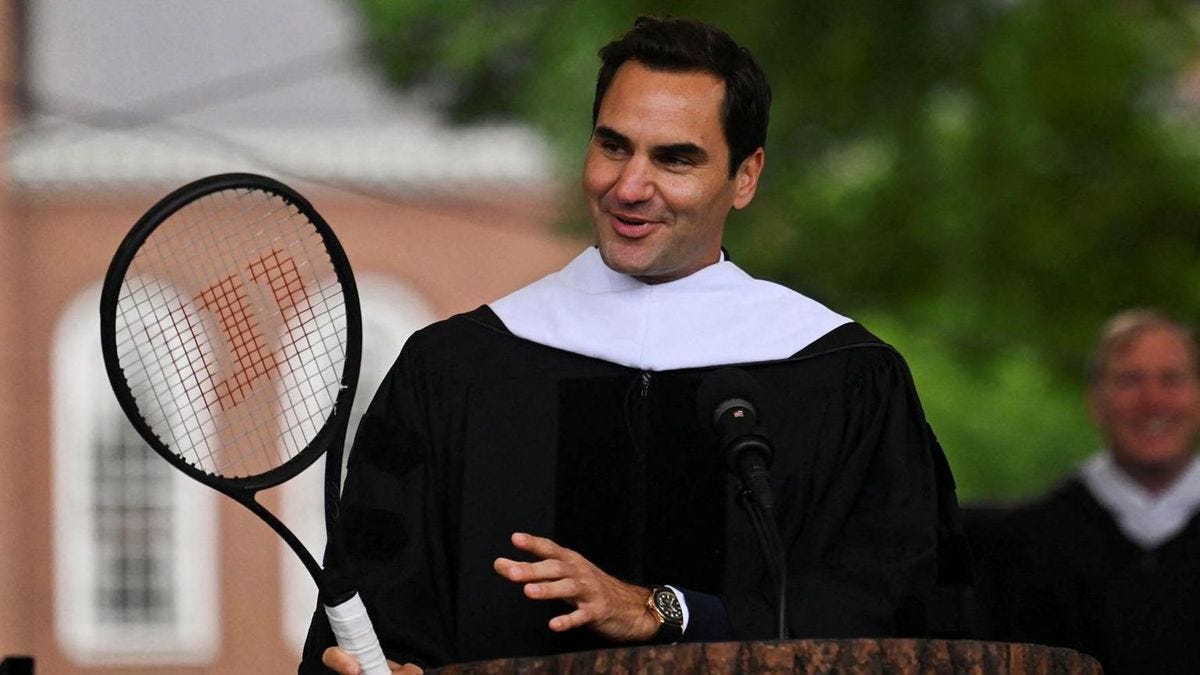Perfection is impossible: Roger Federer on life lessons learned
Atomic ideas from Federer's recent speech
Negative energy is wasted energy. The best in the world are not the best because they win every point; it's because they know how to deal with loss and keep moving forward.
Roger Federer, the legendary tennis player, shared his insights and life lessons with the graduating class of 2024 at Dartmouth College. Drawing from his remarkable career and personal experiences, Federer offered valuable advice on hard work, resilience, and living a balanced life. Here are the key takeaways from his speech.
Negative energy is wasted energy. The best in the world are not the best because they win every point; it's because they know how to deal with loss and keep moving forward.
Effortless is a Myth
Success often looks effortless, but it requires immense dedication and hard work. Roger Federer shared that behind his seemingly easy play were years of rigorous training and practice. He emphasized that achieving a state of effortless performance is the ultimate accomplishment, requiring one to outwork others consistently.
Effortless is a myth. The truth is I had to work very hard to make it look easy
This resonates beyond sports, as many successful people face similar unseen efforts and struggles. Federer encouraged graduates to recognize that no one achieves great things without putting in significant effort behind the scenes.
Belief in Yourself Must Be Earned
Self-belief is crucial but must be earned through hard work and experience. Federer recounted a pivotal moment in his career when he overcame self-doubt by challenging his opponents’ strengths rather than avoiding them.
Belief in yourself has to be earned. You need a whole arsenal of strengths so if one of them breaks down, you've got something left
This approach boosted his confidence and performance. He highlighted that belief in oneself comes from repeatedly facing and overcoming challenges. Graduates were encouraged to aim high, face their fears head-on, and earn their self-confidence through consistent effort and resilience.
It's Only a Point
In both tennis and life, setbacks are inevitable. Federer emphasized the importance of moving past failures quickly, focusing on the next opportunity with clarity and determination. This mindset allows for continuous growth and resilience. He shared that even top-ranked tennis players win only slightly more than half their points, illustrating that frequent small losses are part of success. By treating each failure as just a point, individuals can avoid being bogged down by negativity and maintain forward momentum.
Life is Bigger Than the Court
While excelling in one's field is important, having a life beyond it is crucial. Federer stressed the significance of balancing professional achievements with personal fulfillment. He spoke about his love for travel, culture, friendships, and family, which kept him grounded and motivated. This balance prevented burnout and enriched his life experiences. Graduates were encouraged to pursue their passions, maintain strong personal relationships, and seek a well-rounded life.
Teamwork and Relationships Matter
Success is often a collective effort. Federer acknowledged the crucial role of his team, family, and rivals in his journey. He advised graduates to cherish their relationships and the support system that helped them succeed. Building and maintaining strong personal and professional networks are essential for long-term success and fulfillment. These relationships provide support, guidance, and opportunities that are invaluable in both personal and professional life.
Facing Uncertainty with Confidence
Transitioning from professional tennis, Federer understands the anxiety of facing an uncertain future. He reassured graduates that it’s okay not to have all the answers and encouraged them to embrace new opportunities with confidence.
Life after graduation, much like life after a sports career, is filled with unknowns. However, approaching these uncertainties with a positive attitude and a willingness to adapt can lead to exciting new paths and achievements.
Embracing Challenges and Learning
Federer shared how he continuously challenged himself to improve, even when it was uncomfortable. He encouraged graduates to take risks, learn from their experiences, and grow both personally and professionally.
Embracing challenges fosters resilience and innovation, driving individuals to exceed their limits and achieve greater success. Learning from failures and setbacks is a critical part of this process, enabling continuous improvement and adaptation.
Balancing Work and Life
Managing life effectively is a talent in itself. Federer highlighted the importance of developing patience, discipline, and self-management skills to navigate life’s complexities. Balancing professional commitments with personal well-being leads to a more fulfilling and sustainable life.
Graduates were encouraged to prioritize their mental and physical health, maintain hobbies, and ensure that their professional pursuits do not overshadow their personal lives.
Cherishing the Journey
The journey is as important as the destination. Federer urged graduates to enjoy every moment, learn from their experiences, and keep pushing forward, regardless of the challenges they face. Life is a series of moments and experiences that contribute to growth and happiness.
Embracing and appreciating each step of the journey enriches one’s life and makes achievements more meaningful.



